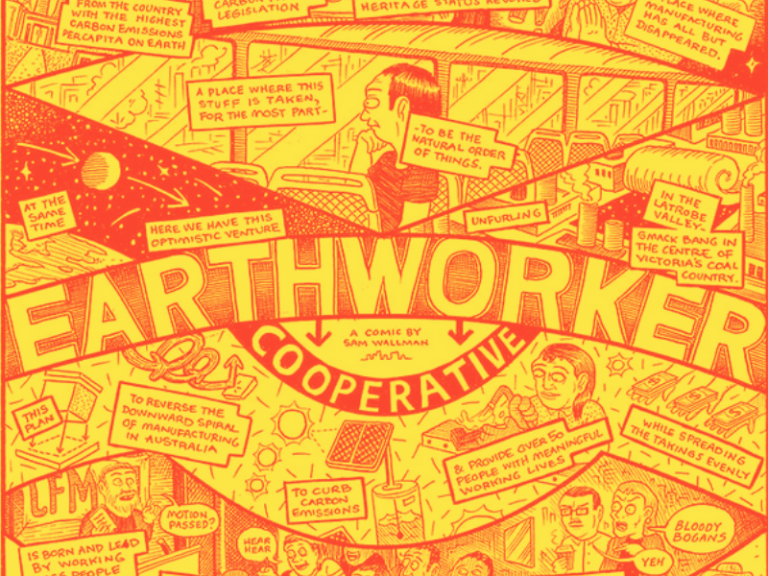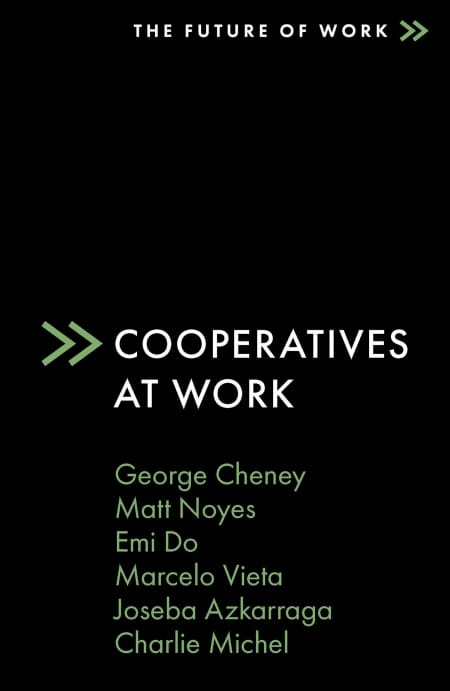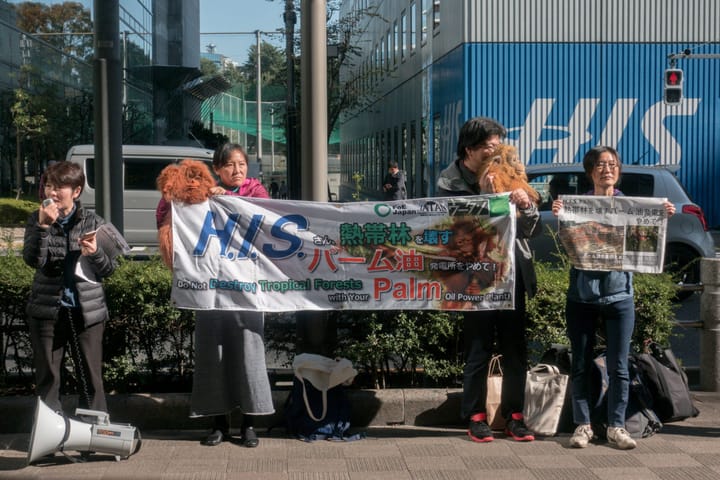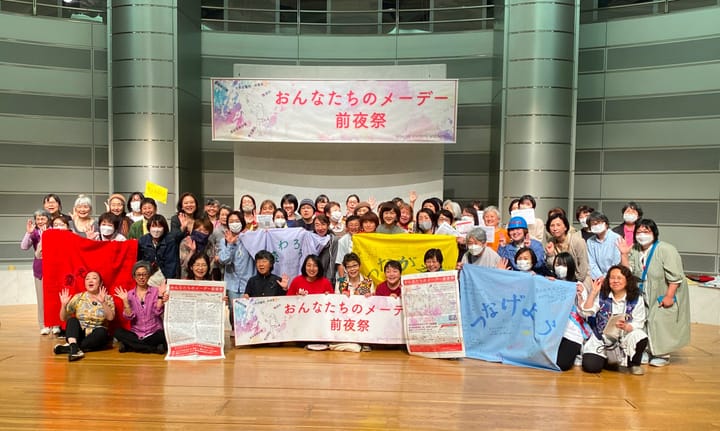The Worker Cooperative Movement and Crises of Our Times
Emi Do and Matt Noyes, on working with worker cooperatives in Asia, and what role the worker cooperatives may play in building our movements and tackling the crises of our times.

This article was originally published on Asian Labor Review
Asian Labour Review Editor’s Note The modern worker cooperative movement, rooted in the social reform movements of the 18th and 19th centuries, has varied histories over the centuries and across and within countries. Depending on their specific goals, forms and practices, the “worker co-ops” have been either celebrated as a transformative laboratory of worker democracy and self-management, or dismissed as a reformist project within capitalism that is doomed to failure.
A new book wants us to take another look at the potentials of the worker cooperatives. As the authors of Cooperatives at Work write, “Worker co-ops represent one important way to address the multiple, interrelated crises of our times. Social, economic, political, health, and environmental crises have become even more apparent with the persistent pandemic of COVID-19 and its variants.”
We spoke to two of the book’s six authors, Emi Do and Matt Noyes, to find out about why they are writing this book now, their experience working with worker cooperatives in Asia, and what role the worker cooperatives may play in building our movements and tackling the crises of our times.
Asian Labour Review (ALR): Congratulations on publishing your book. Tell us about yourself, and how you got involved in the cooperative movement.
Matt Noyes (Matt): I am living and working in Colorado Springs, Colorado. I lived in New York City for 18 years where I was primarily doing work around the labor movement: organizing and education around union democracy. I moved to Japan in 2002 and got involved with the labor movement but also increasingly got interested in cooperatives and the solidarity economy. In 2017, I met Emi in a group that founded the Platform Cooperative Consortium Japan. We went on to collaborate in social.coop, which is an online social media, like Twitter, except that it’s democratic and decentralized and organized as a cooperative.
Emi Do (Emi): I used to be an urban farmer in Vancouver. As is with many small-scale farmers, the idea of forming a cooperative to achieve economies of scale came up. Wanting to learn more about agricultural cooperatives, I went to Japan. The thing that first attracted me to cooperatives was that they provided an alternative to how I grew up, and how I understood the world of work. They allow the people who need or use the products and services of an organization to benefit from its success but also to participate actively in it. Worker cooperatives especially, embody this potential.

ALR: We don’t want to presume that our readers necessarily know or have direct experience with worker cooperatives. Can you tell us what a worker cooperative is, and where this idea comes from?
Matt: It’s good to go back to the idea of association and associationism because, like labor unions, worker cooperatives came out of a much broader idea of social organization, which was sometimes considered utopian in the classical sort of sense of a new or transformed society. When you’re looking at the history of cooperatives, it’s better to think in terms of cooperative economic organization as opposed to narrowly focusing on a particular cooperative form. The phenomenon of cooperative organization is what counts and it has taken many different forms. Sometimes people try to tell the history of worker cooperatives as if they started in England, and that erases a lot of the cooperative experiences that have happened around the world and continue to happen in various forms.
Emi: In different historical periods and in specific contexts, it’s going to take on different forms. A worker cooperative is an economic organization that is owned by its workers. Legally, however, this definition may change from country to country, based on their legal structure. Japan’s a great example. It just passed a worker cooperative law in 2020. But worker collectives have existed there for many years – they were just never able to use the designation of being an official worker cooperative.
ALR: What are the core values or principles of worker cooperatives?
Matt: The International Cooperative Alliance (ICA) has a standard list of seven principles, but repeatedly in history, people have made their own lists of principles. One of the most interesting and important examples was the Mondragón Cooperative Experience. In 1987, they made a list which included principles that weren’t on the ICA’s list. One of them was the “instrumental and subordinated character of capital.” Capital can exist in a cooperative but only under the control of the workers and as an instrument, not as an agent that controls anything.
Another new principle was “labor sovereignty.” The sovereign has the power to make the rules, including whether to follow the rules or not. Labor should have the control to change even the rules. A third principle was “wage solidarity,” which is the idea that wages in the cooperative should not become too unequal nor should they be hugely different from the rest of the community, because that would mean that the cooperative was isolating itself as a little pocket of good conditions and not worrying about the rest of the community.
ALR: I want to talk more about how a worker cooperative can realize those principles in practice. Before that, I want to ask why you have written this book now.
Emi: We wrote this book because we felt that the worker cooperative model could fundamentally change many of the issues we observed in our societal relationship with work. But we started the book project before the pandemic, and when we finished writing, it was the second year of the pandemic, and the working situation had changed. Fundamentally, our global relationship to ideas of everything changed.
There were so many different crises that were occurring. And it made so many people realize that we had forgotten how to engage with one another. Worker cooperatives and other kinds of solidarity economic organizations that we cover in the book address how the way we interact with one another in the workplace can reflect how we interact with one another in society. That’s why this book feels so important for the moment.
ALR: In the book, you write that you hope worker cooperatives can help address a number of crises of our times. Let’s start with the crisis of democracy. When people think about worker cooperatives, one of the first things they think about is that it should be run democratically by workers. How does it work in practice?
Emi: Anybody who has been involved in the conversion of a conventional business into a cooperative will know that one of the biggest obstacles is creating a culture of democracy because it’s so alien to the way we think about work. It’s very hard to shift gears from all of the patterns that we have that are based on inequality and hierarchy to a democratic way of functioning. Having that experience of running your organization democratically is very powerful.
Matt: I see that in unions too. Workers who run a democratic union have a tremendous experience of what democracy can mean. If you think of cooperatives as an ecosystem, embedded in social movements and allied with other organizations, they are actively creating a democratic layer in society that influences the society around them.
One of our co-authors Marcelo Vieta writes about factories that have been taken over by workers. Those who work in those organizations are directly linked to political movements. They come out of democratic movements. Many people who are leaders in the cooperative movement in Korea came out of the democracy movement, including worker organizers, and they have become key players in the cooperative movement there. There’s a very direct kind of connection on both ends: cooperatives contributing to democratization, and cooperatives as an expression of democratic movements.
ALR: How can worker cooperatives address gender-based hierarchies and inequalities in the workplace?
Emi: The short answer is that they can’t, just as women’s suffrage didn’t automatically lead to gender equality in society. And yet, we can all agree that it was a foundational step in the women’s rights movement for women to be able to vote. In a worker’s co-op, female workers are as much owners as their male counterparts. Yet it takes everyone within the co-op to ensure a workplace culture which challenges gender norms and biases that each member brings with them.
Matt: We interviewed Esther Gicheru at Kenya Cooperative University, who told us about the history of cooperativism in Kenya, and how young people were not, generally speaking, interested in cooperatives at all because they associated cooperatives with the big agricultural cooperatives, which were very male dominated. But the worker cooperatives, which are a very new phenomenon in Kenya, are very different and appeal to young people. There is a construction cooperative, for example, that was started by students at the University who needed to make an income while they were studying. They very purposely started it with gender equality with women doing a trade that might typically be reserved for men.
In Japan, there is also a kind of historical split along gender lines. There are two national cooperative groups: the Japan Worker Cooperative Union (JWCU) that came out of the male-dominated labour movement, and the Japan Workers’ Collective Network (WCNJ) that came out of the consumer cooperatives and out of women’s organizing primarily around food safety and ended up generating a very grassroots-oriented, democratic organizing. The two groups get along, but there’s always been a kind of running debate between these two currents.
One of the concrete things that we found super interesting is the DisCO cooperative in Spain. They have very consciously integrated feminist economic principles in their cooperative principles. For example, they recognize, account for and compensate members for care work, which is the type of work in an organization that is typically not recognized as work, almost always done by women, and rarely if ever compensated. And yet, it’s crucial to the success of the survival of organizations. There’s a real focus on care and recognizing the role of care in organizing and building organizations.
ALR: You put the climate crisis at the centre of your thinking in this book. How can worker cooperatives help tackle the climate crisis?
Emi: The exacerbation of our climate crisis is a result of the exploitative nature of our industries and the extractive nature of how socially we’ve been conditioned to consume. Worker cooperatives can provide an alternative way to operate in a non-exploitative, non-extractive way through their organizational culture. They can provide, for example, a bicycle cargo delivery service, or solar installation. What’s so powerful about the cooperative movement is its commitment to supporting other cooperatives. And so rather than thinking we’re going to conquer the world or how our cooperative is just going to get bigger and bigger, it’s sharing resources and encouraging other cooperatives, which are locally based and have appropriate local solutions that are appropriate for their geography, to come up with their solutions.
Matt: The Earthworker Cooperative in Australia is an incredible example of how cooperatives can come out of social movements, in this case, out of a Labor-Environmental Alliance. These long-term activists and organizers concluded that there just wasn’t time to try to follow the strategy of slowly changing government policy. We have to make the change now, they decided, and that means we need to just start making the energy system we need. So they created a worker cooperative, which creates and installs solar panels and solar water heaters. With their strong connections to the union movement, they have been able to spread this technology among union members.
ALR: I want to talk about how workers can be treated with respect and dignity at work. How can cooperatives promote this?
Matt: CECOSESOLA is a massive cooperative in Venezuela. It has been around since the 1960s and has survived all kinds of political upheaval and economic crises. Twenty years ago, they made a very conscious decision to de-institutionalize their cooperative. They moved away from a traditional hierarchical structure, and towards a pattern that is essentially based on constant conversation among the members. They have meetings upon meetings. That is how they reproduce the culture and govern the co-op.
We asked them if they have a list of cooperative principles, and they said, “We don’t and we wouldn’t want one because it would quickly become irrelevant as things are always changing.” What matters is the actual conversation among the members. When we interviewed them, they were in the middle of a 38-week series of discussions on the theme of compassion. They were building relationships of trust and compassion through direct engagement with each other. Solidarity that produces dignity and respect has to be cultivated and produced. It doesn’t happen automatically.
ALR: We have covered a lot of ground in a short space of time. What other potentials do you see in worker cooperatives?
Matt: The same principle of worker cooperatives is involved in the concept of the solidarity economy. It looks at all the different spheres of economic activity as places to practice democracy and solidarity. The solidarity economy perspective is a movement perspective. It’s a social transformation perspective. It’s not a business development perspective. Some people are also talking about a “new cooperativism”, which resembles the solidarity economy perspective and consciously takes on diversity, inclusion, equity and justice.
There is also a shift in the conception of what life is, and what it means to be human, particularly in relation to nature. We looked at the concepts of Buen Vivir and Sumak Kawsay in Latin America, very interesting hybrid concepts that combine indigenous and other social movement perspectives: questioning development, questioning growth, questioning progress, those fundamental concepts that are so important ideologically to capitalism. That is informing cooperativism of a new kind.
ALR: You have both worked with and observed cooperatives in Japan. Tell us more about your own experience..
Matt: In Japan, my experience was with the JWCU and the WCNJ. They have very different histories, very different demographics and very different organizing cultures. I felt closer to the methods and the approach of the WCNJ because they tend to do smaller types of businesses that emphasize democracy and equality. The typical one would be a group of women who get together and make bento lunch boxes. It’s usually small-scale and very strong on direct democracy, and women controlled. The leadership of the WCNJ is all people from these collectives, and it is very low on bureaucracy. Coming out of the women’s, antiwar and environmental movements in the 70s, it also has a strong political character.
Emi: The Asia Pacific region has so many large institutional cooperatives, such as agricultural cooperatives and consumer cooperatives, many of which are very much another arm of the government. How do you differentiate the cooperative movement from the kind of bureaucratic organizations that most people associate it with? There’s actually a compilation of case studies from across the Asia-Pacific region, which looks at how this affects cooperative governance and operations. It is particularly interesting to see cooperatives that emerge in communist countries.
ALR: One common critique of the worker cooperative movement is, and I highly simplify it here, that because it still operates within capitalism and faces all the pressures and constraints of a competitive system for profit-maximisation, this limits the possibility of transcending the system. What would be your response?
Emi: I was recently introduced to this idea of a two-loop system of change. You have this dominant system, and then you have the emergent system. You can try to build the emergent system. But if there’s no transition from the dominant system to the emergent system, the emergent system is just a whole bunch of disparate movements, and it’s never going to take hold.
This idea that cooperatives are not legit because they exist within the market economy speaks to not thinking about the need to transition. You need to bring people from the dominant system into the emergent system. I think cooperatives can help acquire the skills necessary to thrive in a more just, equitable and resilient emergent system.
Emi Do works at Sustainability Solutions Group–an environmental consultancy worker co-operative–in addition to being the cooperative coordinator at Young Agrarians.
Matt Noyes is a social movement educator and a member of the Grassroots Economic Organizing Collective and several cooperatives, including Social.Coop, MayFirst.Coop, and the Colorado Solidarity Fund.


